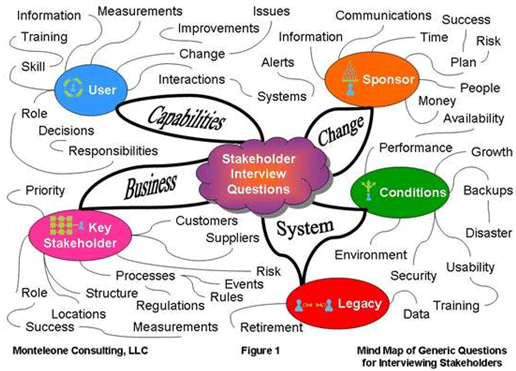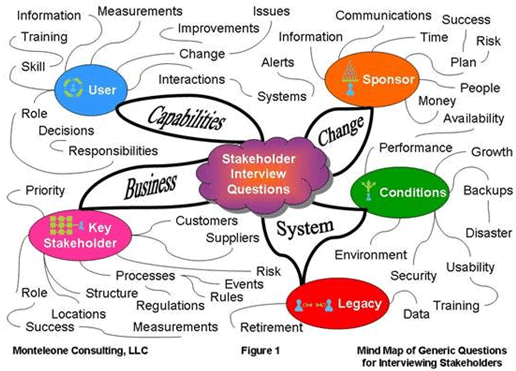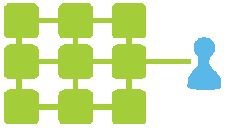
Generic Questions for Interviewing Stakeholders
As a professional instructor for business analysis and project management, I am often asked by students what questions they should ask stakeholders during the elicitation interviews. Of course the answer is that it depends on the solution scope. However, the business analysis team can use a list of generic questions as a start for all the interviews.
With this in mind, I have developed a list of generic questions. I started first with a mind map to organize my thoughts. With the purpose (Stakeholder Interview Questions) in the center of the map, I branched out in four need directions or threads: Business, Capabilities, Change, and System. For the first three threads, I associated targets of key stakeholder, user and sponsor. For needs involving a system, I associated targets of conditions and legacy; assistance from a systems analyst may be needed for these targets. Then for each target, I related question keywords. Note that the project manager may be the more appropriate role to cover the change branch since it deals with project execution questions even though solution scope changes may be discussed.
The mind map (Figure 1) is below, followed by a list of questions derived from the map keywords.

|
Key Stakeholder |
Purpose is to capture business requirements that trace back to the stated business needs provided in the project vision and scope. |
 |
|
|
User Questions |
Purpose is to capture user requirements for later analysis. During analysis, the business analyst develops solution requirements. |
 |
|
|
Condition Questions |
Purpose is to capture the environmental conditions that are needed along with the capabilities of the system. These are referred to as nonfunctional requirements or possibly quality of service requirements if used in a service level agreement. |
|
Legacy Questions |
Purpose is to capture system transition requirements needed for a smooth system implementation. These requirements are one-time events needed for production cutover. |
 |
|
|
Sponsor Questions |
Purpose is to capture feedback how change needs to be managed and if there is any possibility for improvements to the project. |
 |
|
I recommend the business analysis team start with this generic list and augment it with solution scope specific questions. During or after elicitation, the team then needs to validate and analyze the answers and develop solution requirements using appropriate modeling and traceability techniques. Good luck with your interviews.
Don’t forget to leave your comments below
Mark Monteleone holds a B.S. in physics and an M.S. in computing science from Texas A&M University. He is certified as a Project Management Professional (PMP®) by the Project Management Institute (PMI®), a Certified Business Analysis Professional (CBAP®) by the International Institute of Business Analysis (IIBA®), a Certified ScrumMaster (CSMTM) and Certified Scrum Product Owner (CSPOTM) by the Scrum Alliance. He holds an Advanced Master’s Certificate in Project Management and a Business Analyst Certification (CBA®) from George Washington University School of Business. Mark is also a member of the Association for the Advancement of Cost Engineering (AACE) and the International Association of Facilitators (IAF). Mark is the President of Monteleone Consulting, LLC and can be contacted via e-mail at [email protected].
토렌트
… [Trackback]
[…] Here you will find 94655 more Info to that Topic: batimes.com/articles/generic-questions-for-interviewing-stakeholders/ […]